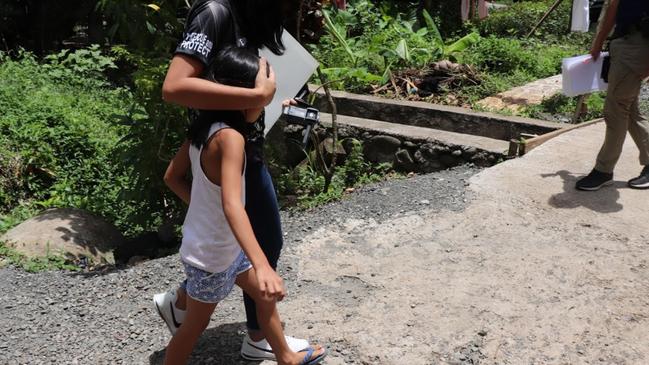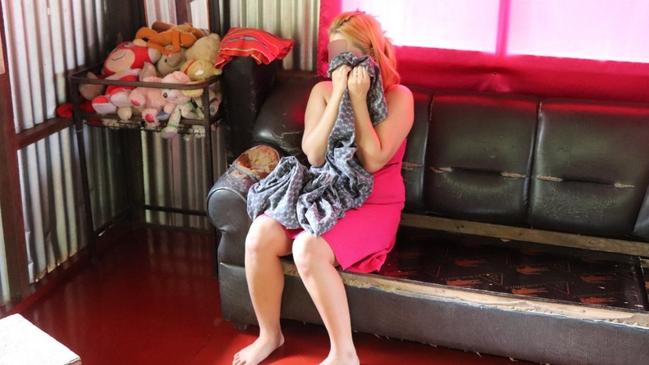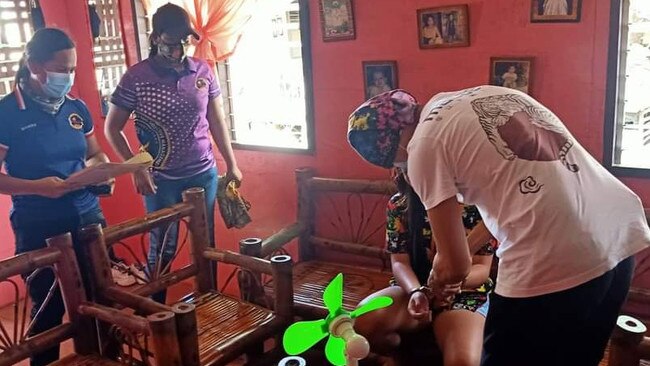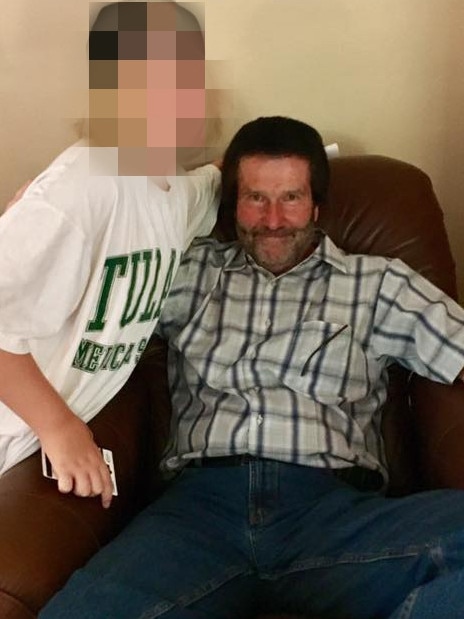AFP and Philippines Police investigation into Ian Schapel leads to 13 girls being rescued from remote village
An investigation into a veteran SA public servant who filmed himself watching children being abused online ended in the rescue of 13 little girls and two young women.
Police & Courts
Don't miss out on the headlines from Police & Courts. Followed categories will be added to My News.
As young as four, the girls emerged blinking into the sunlight of their remote Philippines village, police and support workers at their side.
Behind them, the women who had allegedly been facilitating their online abuse – the mothers, aunts and cousins of some of the children – were in handcuffs, covering their faces as officers took photos.
A world away in Adelaide, the man whose crimes had led Australian Federal Police and then their Philippines counterparts to the exploited young girls languished in a prison cell.
On Wednesday he was sentenced to 16 years in prison.

The veteran public servant had exploited the abject poverty of the remote communities in the Philippines to watch the children being abused.
Ian Ralph Schapel, 68, was charged by Australian Federal Police with 50 offences including dozens of charges of facilitating the abuse of a child overseas.
On Wednesday, District Court Judge Paul Cuthbertson said Schapel’s crimes relied on the economic imbalance between Australia and the Philippines.
During the lengthy sentencing, Judge Cuthbertson rejected the submission put forward by Schapel’s lawyer that the former human resources manager had not turned his mind to the devastating impact the crimes would have on the children.
“He must have known at least in a general sense that there would be real life suffering from these crimes,” he said.
Among the files found in his home were videos of children as young as three being abused in Skype calls from the Philippines.
In several of those videos Schapel could be seen when he turned his camera on.
Psychologist reports prepared for the court said Schapel was a lonely man whose social isolation had spiralled after his retirement from the public service.
How a vile abuser was brought down
Schapel was many things – a veteran public servant who retired after 45 years in a range of roles and a prolific traveller whose holiday snaps adorned social media – but for police it was his hoarding personality that helped them crack the case.
His house, like his electronic devices, and no doubt his mind, were in a state of complete disarray.

On February 28, 2020, Schapel flew into Melbourne from an overseas trip.
Australian Border Force officers conducted a routine search of his electronic devices and found child abuse material on an iPhone and two iPads.
Initially Schapel was released on bail and sent home to Adelaide.
But waiting for him at this home were officers from the SA Joint Anti-Child Exploitation Team – a specialist unit made up of state and federal officers with the ability to call on expansive resources and skill sets.
‘1.2 million files of chaos’
AFP Senior Constable Keith Walther was one of the first officers in the house and led the investigation.
“It was a chaotic scene, the sheer volume and disorganised nature of the data – floppy disks, DVDs, USBs, computers and printed images showed the way (Schapel) kept this material,” he said.
“There were 174 floppy disks – we checked some and found adult pornography but we had to seize them for detailed examination because we couldn’t discount that they also held child abuse material.”
More than 260 electronic and storage items were seized, leaving officers with 1.2 million files to go through, including 53,000 images and videos of child sexual abuse.
“We identified files which changed the investigation from possession of this material to large-scale live streaming with multiple victims and facilitators overseas,” Mr Walther said.
Victim-identity specialist Leading Senior Constable Stephen Hegarty took over the mountain of digital evidence found in Schapel’s home.

“What made this a bit more of a challenge was his hoarder nature, there was no pattern to the way he stored these items,” he said. “It was very much 1.2m files of chaos.
“Initially I found adult women involved in live shows from places like South East Asia who had been screen recorded and the recordings left throughout the devices. There were hundreds of these files.”

Schapel’s controlling nature revealed
Among the files of legal pornography Mr Hegarty begun to find clips of children as young as four being abused.
“I knew I had to up my game on this one, it became all about helping these children and removing them from harm,” he said.
“He had real voyeuristic tendencies, it was all about watching, a very strong character trait of him that I haven’t come across to that extent.
“He had a controlling, demanding nature, he would direct the children.
“Every now and then he would come into view, he would say things like ‘I want them to watch’.
“He wanted these kids to watch him gratify himself. I found that particularly unpleasant.”
While Mr Hegarty was scouring the images, analysing every detail of the video and the messages that would occasionally pop up on screen, Mr Walther was following the money.
Through Schapel’s bank records detectives identified 44 different transactions of money to the facilitators of the abuse through various intermediaries.
He was paying as little as $30 for the abuse and was seen to comment “now you starve” when he didn’t get what he wanted.
Backtracking through bank details from the facilitators led the AFP to more leads in Australia, including a 71-year-old man in Geraldton, WA who had spent $443,000 on live online child sexual abuse.
In May this year the Geraldton man was sentenced to 14-and-a-half years in prison for 58 offences uncovered as a result of Operation Tatsuta – the investigation into Schapel’s crimes.


How the girls were rescued
Meanwhile, Constable Hegarty was handing over a package of details to Philippines police, including the faces of victims and facilitators, identifying features of their homes and more to AFP officers in Manila who passed them onto local authorities.

In August 2020, Philippines police raided multiple properties across a remote community in the eastern area of the country, rescuing the 15 girls and young women and arresting five women.

Some of the alleged facilitators were the mothers, aunts, cousins and friends of the young victims. They remain before the courts.
Back in Adelaide, officers combed through Schapel’s home, identifying his distinctive furniture and art in the videos he recorded of himself watching the abuse. Those videos were later tied to the offender.
Schapel would eventually be charged with 50 counts of engaging in sexual activity with a child outside Australia, three counts of persistent sexual abuse of a child outside Australia as well as accessing or possessing 55,000 child exploitation images.
Both Mr Hegarty and Mr Walther interviewed Schapel.
They said he was looking to shift the blame during the police interview and played the victim.
In a national first the AFP moved to seize Schapel’s house as an instrument of crime.
Police had hours of footage of him sitting in the loungeroom at the property commissioning the abuse of young girls.
Schapel settled that lawsuit for $165,000, half the value of the house.
Judge Cuthbertson said Schapel’s case was worse than the recent sentencing of Geoffrey Moyle who was jailed for filming himself abusing children overseas.
Moyle’s sentence was recently significantly increased after an appeal in the Supreme Court.
Judge Cuthbertson sentenced Schapel to 15 years, three months and 19 days with a non-parole period of ten years for the Commonwealth offending.
For an additional state charge of possessing child exploitation material, Schapel was sentenced to nine months in prison, which must be served separately to the Commonwealth offending.
Schapel has been in custody since April 2020 and will be eligible for parole in early in 2031.



